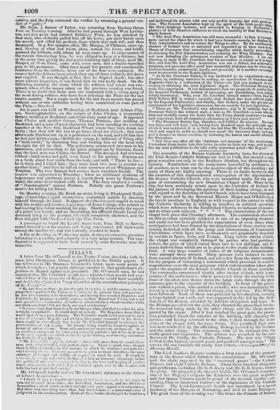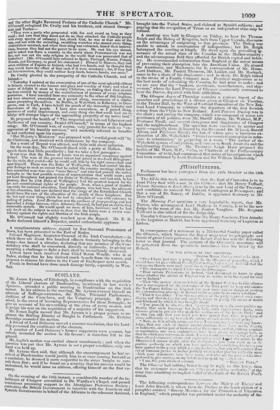and to other such subjects. * * The consecration of
the new chapel took place this (Sunday) afternoon. The ceremonials observed on this occasion certainly rendered it one of an imposing character, and could not but have gratified the expectations of even those whose anticipations had been framed by the descriptions of those similar cere- monies, bedecked with all the pomp and circumstance of Continental Catholicism, which have been so frequently and graphically described by tourists in Spain, Italy, and France. Long before eleven o'clock, the chapel was completely thronged by parties who had purchased tickets, the price of which varied froims two to ten shillings, and th: assets derived from which are to be placed to the credit of the building' fund. A very large number of ladies of all religious denominatious were amongst those present. Many persons were induced to come from remote districts of Ireland, and not a few from the sister country, for the purpose of witnessing a ceremonial which promised to excel in magnificence even the most gorgeous which had heretofore taken place under the auspices of the Roman Catholic Church in these countries. The ceremonies commenced shortly after twelve o'clock, with a pro- cession of the ecclesiastics; which proceeded from the sacristy to the front of the altar, and thence down the large aisle through the great entrance-gate to the exterior of the building, la front of the proces. sion walked a priest, who carried a crucifix, who was immediately fol- lowed by a numbor of the inferior clergy, two and two. The Bishops next followed. Esch of these was preceded by his chaplain, carryine° a large lighted wax torch, and was supported on his left by the Arch. deacon of his diocese, attended by inferior clergymen and boys. AS the Bishops passed down the aisle, they chanted the prescribed service: the responses being made by the other clergy and the choir, accom- panied by the organ. After it had reached the great gate the proces- sion proceeded round the exterior of the building, still Chanting the service ; and having returned to the altar, walked through the lesser aisles of the chapel ° whit the same forms. The pontifical high mass was next eelehrettel by the officiating Bishop, aaested by his brethren and the other clergy. Time ceremony, with all its external aids, was really grand and impressive. The sermon was preached by the most Reverend Dr. Crolly, the Catholic Primate. his text was " Glory to God in the highest, on earth peace and goodwill amongst men." The service did not conclude till nearly four o'clock.—Corre.spondettqf the Morning Herald.
The Chili Southern Riporter contains a long account of the proceed- ings at the dinner which followed the consecration. Mr. O'Connell
took the chair, supported by the " venerated guests "—the Catholic
Primme and ei;ilit Catholic Bishops. About time hundred clergymen and gentlemen, including Mr. G. S. Barry cud Mr. E Ti. Roche, formed
the party. On proposing the Queen's health, Mr. O'Connell remarked,
that tit her Majesty's subjects the Catholics were the great majority; and that Queen Victoria might be proud of the devoted loyalty—loo- t:cedilla. from no interested motive—of the dignitaries of the Catholic Chureil The Lord-Lieutenant's health was introduced by a speech laudatory of the Martinis of Normanby, and civil to Lord Ebringtor. The great toast of the evening was "His Grace the Primate of Ireland,
and the other Right Reverend Prelates of the Catholic Church." Mr. O'Connell eulogized Dr. Crotty and his brethren, and abused Orange- men and .Tories-L-
"They were a party who persecuted with fire and sword as long as they could; and now that they dared not do so, they attacked the Catholic people soith every species of calumny; but, thank God, he was at that side of the ose, and not with the swindling, swaddling wretches who abused every thing, violated their contract, mid when their sting was extracted, hissed their malevo- lence, because they bad not the power to do more. He cast his eye abroad, and be asked was there a country in the world where Protestantietn was not free, and was not the only religion in the world that was persecuted that of Catholics? (Mr. O'Connell here referred to Spain, Portugal, Russia, Poland, preside, and Germany, i, in proof his statement.) Blessed. he Heaven, they had wen millions of Papists n Ireland, who had two hands, and, he thought that they would have the effect of four each if it were necessaryfor, if they had not determination, they could neither keep lands, houses, hands, nor arms."
Dr. Crony gloried in the prosperity of the Catholic Church, and of Ireland— Yesterday I assisted at the consecration of one of the most splendid edifices in Ireland, created to the honour and glory and worship of God.; and what a source of delight it must be to every Christian, on finding that that church has been erected by means of the contributions of persons of every religious persuasion. I have travelled from one extremity to the other of this kingdom, and have observed everywhere as I passed along, monuments of a similar nature presenting themselves. In Dublin, in Waterford, in Kilkenny, in Dun- garees, and in Cork, I have beheld the proofs of the increasing industry and benerolence of the people. I have seen everywhere as I passed along, specimens of useful improvement, and every thing else ;hat could lead me to indulge 'still stronger hopes of the approaching prosperity of my native land."
He proposed the health of "The respected and beloved Liberator and Pacificator of our country, Daniel O'Connell," in terms of the highest eulogy. Mr. O'Connell was, of course' very grateful for such an "ex- aggeration of his humble services," aud modestly referred to benefits be had conferred upon his country.
"Her 3Iajesty's Ministers" was proposed with "cordial good-will" by the Chairman, and received with enthusiasm by the company. Not a word of Repeal was uttered, and little said about agitation.
On the next day, Mr. O'Connell dined with a party at Mallow. His speech there had little peculiarity ; but we take a few passages— It was true that the House of Lords was an organized conspiracy against Ireland. The man of the greatest talent had joined in it—Lord Brougham See the stain that wretch—for he would call him by his right name—had east apon himself. There was the Duke of Wellington, who liad carried his des- potic feelings to such an extent that he called the country meetings which had been assembled some time since "mere farces," and who had praised the rotten boroughs as the best possible system of representation that could exist ; and yet Lord Brougham had praised the Duke of Wellington, and had said, in II18 presence, that he (the Duke of Wellington) had the greatest respect for the law and constitutional rights of the people. Next, when a grant of 30,0001. was made for national education, Lord Brougham, who had been the advocate of free education, had now declared that tire clergy of the Established Church should have the care of the education of the youth of these kingdoms. But the last and worst thing which he had to complain of was with reference to packing of juries. Lord Brougham was the partisan of jarbr-parhing, and had impeached a Judge because, when Attorney-General, he had put an end to that abominable system. He would speak no inure of him, however; and he had only dwelt on the subject in order to show that the Lords were a sworn con- federacy against the rights and liberties of the Irish people.
Mr. O'Connell but slightly touched upon the Repeal. Mr. E. B. Roche declared himself a Repealer, amidst enthusiastic applause.



























 Previous page
Previous page